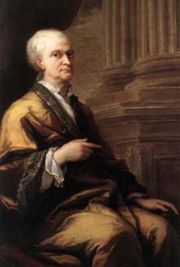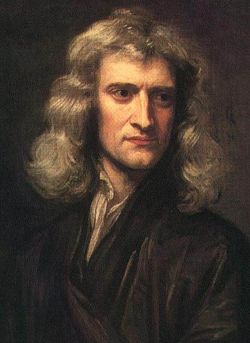It is not often you get to hear the words of someone who made such a big impact on our lives. A Mathematician, English physicist, astronomer, natural philosopher, alchemist and one of the foremost scientific intellects of all time, the greatest genius who ever lived, Newton, Sir Isaac (1642-1727).
EK: Welcome Sir. I'm a senior student reporter with AHSTimes. This may sound unbelievable, but i'm from the year 2008. Being able to interview you at this very moment, is indeed a honour i have.
IN: Hi. It's nice being able to talk to someone from the future. I would try my best to co-operate with you.
EK: In a 2005 poll of the Royal Society of who had the greatest effect on the history of science, you were even deemed more influential than Albert Einstein. Are you glad to hear that?
IN: Yes. It's great to hear that people appreciated the things i had done for them.
EK: I heard you have suffered from Asperger syndrome, a form of autism. Is it true?
after long thinking...
IN: Erm. Let's see what are the symptons of Asperger syndrome. First, limited but intense range of interests, especially specific intellectual areas. Secondly, difficulty in social relationships, especially responding appropriately to others. Lastly, problems communicating with others, such as difficulty making conversation or understanding others. I'm not exactly sure whether i had Asperger syndrome.
EK: Well, it was heard that you hardly spoke, had few friends and was often bad-tempered around them. You were often so engrossed in your work, the science of physics, that you forgot to eat. You also gave your scheduled lectures, even if no one came. So I strongly suspect you have Asperger syndrome.
IN: WHAT!?! That's impossible. What kind of interview is this? I'm leaving right now.
EK: Calm down Sir. I'm really sorry, please assume that i said nothing.
IN: If you were to continue with this topic, then i would leave straight away.
EK: Okay Sir. You were engaged to Anne Storer, but there were rumours that you remained a virgin, is it true?
IN: I was engaged to the apothecary's stepdaughter, Anne Storer, before I went off to the University of Cambridge at the age of 19. But I was engrossed in my studies, so the romance cooled and Miss Storer married someone else. I kept a warm memory of this love, so I have no other recorded "sweet-hearts" and never married.
EK: You were raised by your uncle, is it true?
IN: My father died six months after my birth. My mom then remarried that sickening man, Barnabas Smith and moved away, leaving me to be raised by my uncle. But after Barnabas Smith died, she then returned to live with me.
EK: You were said to be born prematurely and posthumously?
IN: My mom, Hannah Ayscough, said my survival was in question for some time, and by tradition I was even small enough to fit into a small 'quart pot'.
EK: Your signature can still be seen upon a library window sill at The King's School, Grantham.
IN: I was educated at The King's School, Grantham from the age of about twelve until seventeen. Unfortunately, I was removed from school at 1695, because my mom wanted me to be a farmer.
EK: I see, I see. What happened in the end?
IN: Henry Stokes, master at the King's School, persuaded mom to send me back to school so that I can complete my education. I did it at the age of eighteen, achieving an admirable final report.
EK: You were then admitted to Trinity College, Cambridge. As Westfall suggests, the most important 'watershed' in your life?
IN: Yeah. I discovered the generalized binomial theorem and began to develop a mathematical theory that would later become calculus. Soon after, I receives my bachelor of arts degree.
EK: Your University closed down as a precaution against the Great Plague. For the next 2 years, what did you do?
IN: I worked at home in Woolsthorpe on calculus, optics and the law of gravitation.
EK: From 1670 to 1672, you lectured on optics, you also investigated light. Can you tell us more about it?
IN: I know that prism could decompose white light into a spectrum of colours, and that a lens and a second prism could recompose the multicoloured spectrum into white light. I also know coloured light does not change its properties,by separating out a coloured beam and shining it on various objects. I...
interupted...
EK: Okay, enough, enough. We get the idea. For more details, please go to see "Newton's theory of colour"
EK: Heard you work on the mathematics of gravitation in at home. What was your end product?
IN: I discovered gravitation and its effect on the orbits of planets. I then published the Philosophiae Naturalis Principia Mathematica, which stated the three universal laws of motion.
EK: WOW. That was impressive.
IN: Although the laws of motion and universal gravitation became my best-known discoveries, we men, are not to view the universe as a mere machine, as if akin to a great clock. Gravity explains the motions of the planets, but it cannot explain who set the planets in motion. God governs all things and knows all that is or can be done.
EK: You have religious views too?
IN: Of course. I study the bible and also wrote works on textual criticism, most notably 'An Historical Account of Two Notable Corruptions of Scripture'. I even attempted to find hidden messages within the Bible. Haha, though unsucessful.
EK: Remember the apple that hit your head?
IN: Gravity was not limited to a certain distance from earth, but that this power must extend much further than was usually thought. Why not as high as the Moon. That must influence her motion & perhaps retain the moon in her orbit, I felt a calculating what would be the effect of that supposition.
EK: Erm, i don't get it.
IN: Look, the question was not whether gravity existed, but whether it extended so far from Earth that it could also be the force holding the moon to its orbit. I eventually showed that if the force decreased as the inverse square of the distance, one could indeed calculate the Moon's orbital period, and get good agreement. I guessed the same force was responsible for other orbital motions, and hence I named it "universal gravitation".
EK: Okay...
IN: The notion of gravitation came into my mind. It was occasioned by the fall of an apple, as I sat in contemplative mood. Why should that apple always descend perpendicularly to the ground? Why should it not go sideways or upwards, but constantly to the earth's centre?
EK: Errr, i'm not really good at science. Anyway, I believe the time we have is nearly up. I shall not disrupt your busy scheldule then. thank you for being willing to spend your time for this interview.
IN: Welcome.
p.s. EK stands for me the reporter, whereas IN stands for Isaac Newton
Done by: Koh Ee Kwee (24) 3D
http://en.wikipedia.org/wiki/Isaac_newton#Mathematics
http://www.sparknotes.com/biography/newton/timeline.html
http://rarediseases.about.com/cs/aspergersyndrome/a/041003.htm
skip to main |
skip to sidebar






ME
Koh Ee Kwee
3D (24)
3D (24)
Isaac Newton




that apple tree

Newton's principia

No comments:
Post a Comment